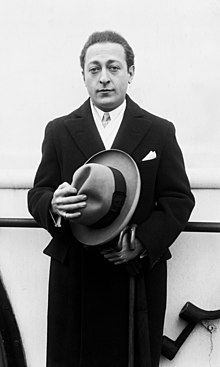Jascha Heifetz
| Jascha Heifetz | |
|---|---|

c. 1920
|
|
| Background information | |
| Born |
2 February 1901 Wilno, Russian Empire (present-day Vilnius, Lithuania) |
| Died | 10 December 1987 (aged 86) Los Angeles, California, United States |
| Genres | Classical |
| Instruments | Violin |
| Labels | |
| Website | Official website |
Jascha Heifetz (/ˈhaɪfɪts/; 2 February [O.S. 20 January] 1901 – 10 December 1987) was a Lithuanian born violinist. Many consider him to be the greatest violinist of all time. Born in Wilno, Russian Empire (present-day Vilnius, Lithuania), he moved as a teenager to the United States, where his Carnegie Hall debut was rapturously received. He was a virtuoso since childhood—Fritz Kreisler, another leading violinist of the twentieth century, said on hearing Heifetz's debut, "We might as well take our fiddles and break them across our knees."
He had a long and successful performing and recording career; after an injury to his right (bowing) arm, he focused on teaching.
Heifetz was born into a Russian Jewish family in Wilno, then part of the Russian Empire. His father, Reuven Heifetz, son of Elie, was a local violin teacher and served as the concertmaster of the Vilnius Theatre Orchestra for one season before the theatre closed down. While Jascha was an infant, his father did a series of tests, observing how his son responded to his fiddling. This convinced him that Jascha had great potential, and before Jascha was two years old, his father bought him a small violin, and taught him bowing and simple fingering.
At five years old, he started lessons with Leopold Auer. He was a child prodigy, making his public debut at seven, in Kovno (now Kaunas, Lithuania) playing the Violin Concerto in E minor by Felix Mendelssohn. In 1910 he entered the Saint Petersburg Conservatory to study under Leopold Auer.
...
Wikipedia
